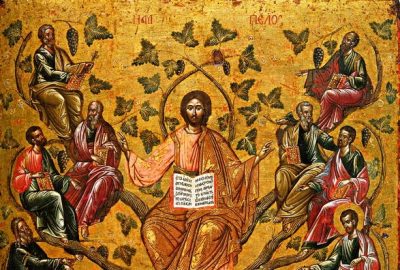Fifth Sunday of Easter April 28, 2024
Acts 9:26-31; 1 John 3:18-24; John 15:1-8
A young man who found an eagle’s egg and put it into the
nest of a prairie chicken. The eaglet hatched with the brood of prairie
chickens and grew up with them. All its life, the misplaced eagle thought it
was a prairie chicken and did only what the prairie chickens did. It scratched
in the dirt for seeds and insects to eat. And it flew no more than a few feet
off the ground with a thrashing of wings like other prairie chickens. Years
passed and the unfortunate eagle grew very old. One day, it saw a magnificent
bird high above in the cloudless sky. Hanging with graceful majesty on the
powerful wind currents, it soared gracefully on its strong golden wings. “What
a beautiful bird!” said the unfortunate eagle to its neighbour. “That’s an
eagle, the chief of the birds,” the neighbour replied, “But don’t give it a
second thought. You could never be like him.” So the poor eagle never gave it a
second thought and it died thinking it was a prairie chicken.
This alarming narrative highlights the significance of our self-identification. Humans are akin to vine branches; we require a vine to graft onto and establish our roots. The vine we choose to attach ourselves to shapes our self-perception, our expectations, and the limits we set for our achievements. Vines vary in shape and color, each vying for our primary loyalty. They manifest as nationalism, like Nazism, ideologies such as communism, or religions including various cults. In contemporary times, materialism, pleasure, and power are some of the most sought-after vines. Aligning ourselves with a false vine can profoundly influence our self-image and the choices we make in life.
In the Gospel of John, Jesus speaks to his disciples about
the imagery of the vine and the branches. He declares, "I am the vine, you
are the branches. Those who abide in me and I in them bear much fruit because
apart from me you can do nothing." These words of Jesus remind us of our
interconnectedness with him and the importance of remaining rooted in his love.
Just as branches draw nourishment from the vine to bear fruit, so too are we
called to draw upon the grace of Christ to live lives of abundance and purpose.
But the process of transformation is not always easy. In the
Acts of the Apostles, we hear the story of Saul's conversion on the road to
Damascus. Saul, a persecutor of the early Christian community, encounters the
risen Christ and is struck blind. Through this experience, Saul is transformed
into Paul, a passionate apostle of the Gospel. His encounter with Christ serves
as a powerful reminder that God's grace has the power to transform even the
most hardened hearts and stubborn minds.
Like Saul, each of us is called to undergo a journey of
conversion and renewal and realise who we really are. We are called to examine
our lives, to identify those areas where we have strayed from God's path, and
to allow ourselves to be redirected by the Spirit. This process of conversion
requires humility, openness, and a willingness to surrender. It requires us to
let go of our attachments to the past and to embrace the new life that God
offers us in Christ.
As we reflect on our own journey of transformation, we are
invited to consider the role of community in supporting and nurturing our
faith. In his first letter to the Corinthians, Paul speaks of the Church as the
body of Christ, with each member playing a unique and vital role. Just as the
branches of a vine are interconnected and dependent upon one another, so too
are we called to support and encourage one another in our faith journeys.
Through our shared worship, prayer, and service, we are strengthened and
sustained by the grace of God.
In the midst of our own struggles and doubts, may we take
comfort in the promise of Christ: "As the Father has loved me, so I have
loved you; abide in my love." May we abide in the love of Christ, drawing
upon his grace and strength to sustain us on our journey. And may we, like the
branches of a vine, bear fruit in abundance, sharing the love and mercy of God
with all whom we encounter.
The misguided eagle in our story was like a branch grafted
on a false or imperfect vine. That is why it remained false or imperfect all
its life. If a wise bird had told it the truth about itself it would have
shifted its self-identification from prairie chicken to eagle. This radical
shift in self-understanding would then enable it to produce in its life the
marvellous feats for which eagles are known. Today that word of wisdom is being
addressed to us: to stop identifying ourselves primarily in terms of nation,
social or economic status, race, or even religious affiliation. Rather we
should see ourselves in terms of our oneness with Christ just as the vine
branch and the vine are one. Then and only then shall we be able to bear good
fruit, the same type of fruit that Christ himself bears.
Happy Sunday


No comments:
Post a Comment